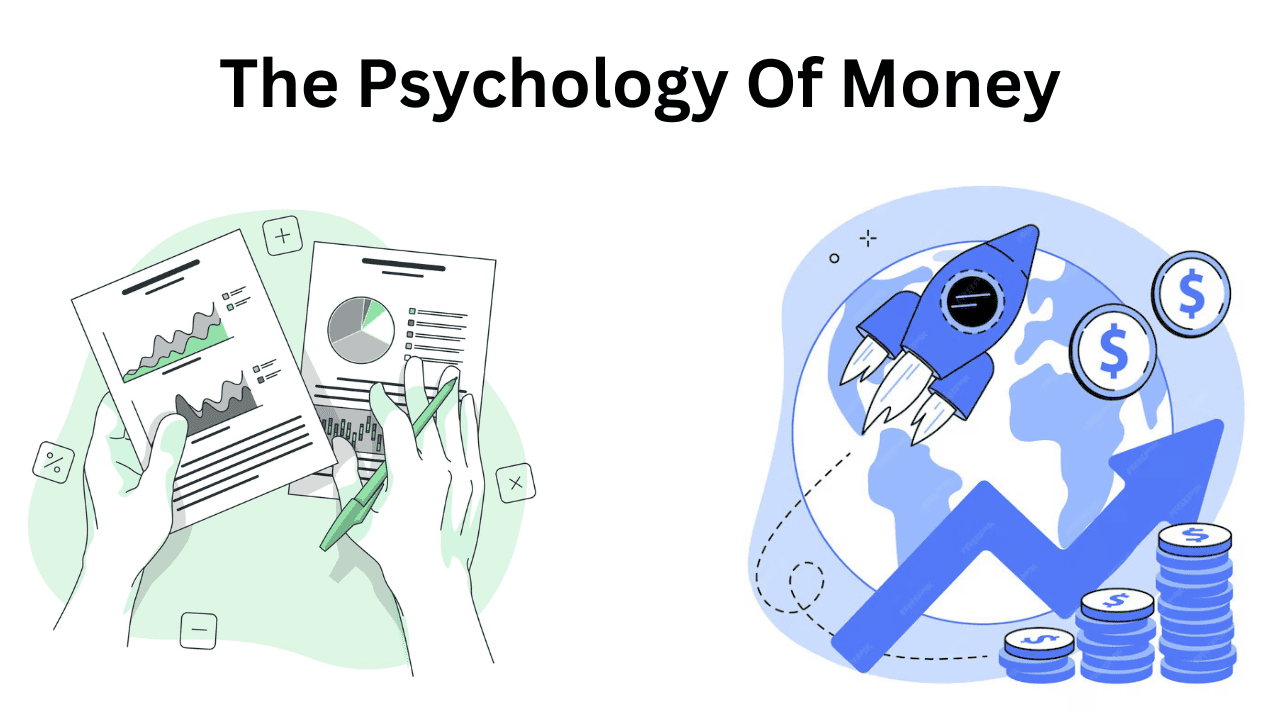Discover how emotions shape your financial choices with insights from The Psychology of Money.
Learn the secrets to smarter money management by understanding the connection between psychology and personal finance.
Understanding the psychology of money is crucial for anyone looking to improve their financial health.
Money isn’t just a tool for transactions; it’s deeply intertwined with our emotions, beliefs, and behaviors.
Money is more than just numbers in a bank account or cash in your wallet. It is deeply intertwined with our emotions, thoughts, and behaviors.

From impulsive purchases to long-term investments, every financial decision we make is influenced by psychological factors.
Understanding the psychology of money can empower us to make better financial choices and build a more stable future.
In this article, we will explore how emotions affect our financial decisions, the role of cognitive biases, and practical strategies for achieving better financial outcomes.
The Emotional Connection with Money:
Why do we spend more when we’re happy or stressed? Why do some people hoard money while others spend recklessly?
The answers lie in the intricate relationship between our emotions and financial behavior. Money often serves as a medium for our desires, fears, and aspirations.

Morgan Housel, the author of The Psychology of Money, wisely said:
“Your personal experiences with money make up maybe 0.00000001% of what’s happened in the world, but maybe 80% of how you think the world works.”
Money evokes a wide range of emotions. From anxiety and fear to joy and excitement, our feelings about money can significantly influence our choices.
Behavioral economists have long argued that financial decisions are often driven more by emotions than by rational thinking.
As psychologist Daniel Kahneman famously said, “Nothing in life is as important as you think it is while you are thinking about it.” This statement underscores the power of our thoughts and feelings, especially in the context of financial decision-making.
1. Emotions and Financial Behavior: The Hidden Drivers
1. Happiness and Spending
When people are happy, they are more likely to engage in celebratory spending. This phenomenon, often referred to as “retail therapy,” creates a temporary sense of fulfillment.

However, overspending in moments of joy can lead to regret later.
2. Stress and Financial Decisions
Stress, particularly financial stress, can lead to poor decisions. When overwhelmed, individuals may make impulsive purchases, take unnecessary loans, or avoid important financial responsibilities.

The fear of scarcity also triggers “panic buying” during crises, such as stocking up on goods unnecessarily.
3. Fear of Missing Out (FOMO)
Social media amplifies FOMO, making people feel the need to keep up with trends or lifestyles beyond their means.

Whether it’s buying the latest gadget or going on an exotic vacation, the pressure to conform often leads to financial strain.
2. Cognitive Biases and Their Role in Financial Choices
Our brains are wired with cognitive biases that can distort financial decisions. Here are some of the most common ones:

1. Loss Aversion
Humans dislike losing more than they enjoy winning. This fear often leads to overly cautious investment choices, where people avoid risks even when the potential gains outweigh the losses.
2. The Endowment Effect
People tend to overvalue what they own. For example, someone might hold onto underperforming stocks for too long, believing they are more valuable than they truly are.
3. Herd Mentality
Investors often follow the crowd, buying stocks during a boom or selling during a crash. This collective behavior is rarely logical and often leads to poor outcomes.
3. The Role of Cultural and Social Influences
Cultural values and social norms also play a significant role in shaping financial behavior.
For instance, some cultures prioritize saving, while others emphasize spending on experiences or family obligations.

Case Study:
In many Asian cultures, saving is a virtue, often linked to future security and family well-being.
In contrast, Western cultures might encourage spending on personal fulfillment and experiences.
Neither is inherently right or wrong, but awareness of these influences can help balance your approach.
4. Building a Healthy Relationship with Money
While emotions and biases are unavoidable, understanding them can lead to healthier financial habits. Here’s how:

1. Recognize Emotional Triggers
Identify situations that make you overspend, such as stress, boredom, or social pressure. Awareness is the first step to breaking negative cycles.
2. Practice Mindful Spending
Before making a purchase, ask yourself:
- Is this a need or a want?
- How will this decision impact my financial goals?
3. Set Financial Goals
Clear goals provide direction and reduce impulsive spending. Whether it’s saving for a home, retirement, or an emergency fund, having a roadmap can guide your decisions.
4. Educate Yourself
Understanding basic financial concepts like budgeting, investing, and compound interest can reduce reliance on emotional decision-making.
5. Why Financial Education Matters
Financial literacy empowers individuals to navigate life’s challenges with confidence. Unfortunately, it’s often overlooked in traditional education systems.

Learning about budgeting, investments, and debt management equips people with the tools to overcome emotional pitfalls.
The Role of Financial Education:
Financial literacy is a crucial factor in mitigating the emotional and cognitive biases that can lead to poor financial decisions.
Understanding basic financial principles, investment strategies, and economic indicators can empower individuals to make informed choices.
Building Financial Literacy
- Read Books and Articles: There are countless resources available that cover various aspects of personal finance, investing, and behavioral economics. Books like “The Psychology of Money” by Morgan Housel offer insights into the emotional aspects of financial decision-making.
- Take Courses: Online courses can provide structured learning. Websites like Coursera and Khan Academy offer free resources on personal finance.
- Engage with Financial Communities: Joining forums or local groups focused on financial education can provide support, accountability, and diverse perspectives.
Setting Clear Goals
Goal-setting is a powerful tool for managing emotions and biases in financial decision-making. By establishing clear, measurable goals, individuals can create a roadmap for their financial journey.

- Short-Term Goals: These might include saving for a vacation or paying off credit card debt. Setting achievable short-term goals can provide quick wins that boost motivation.
- Long-Term Goals: These could include saving for retirement or purchasing a home. Long-term goals require commitment and can help individuals resist the temptation of instant gratification.
Practical Strategies for Better Financial Decision-Making
To effectively manage the emotional and cognitive challenges of financial decision-making, consider implementing the following strategies:

Create a Budget
A budget is a powerful tool that provides a clear picture of your financial situation. It helps track income and expenses, enabling you to make informed spending decisions.

By categorizing your expenses and setting limits, you can reduce impulsive spending and focus on your financial goals.
Practice Mindfulness
Mindfulness techniques can help individuals become more aware of their emotional triggers regarding money.

By practicing mindfulness, you can cultivate a sense of awareness that allows you to pause and reflect before making financial decisions. This can lead to more thoughtful choices and less impulsive behavior.
Automate Savings and Investments
Automation can help eliminate the emotional burden of decision-making.
By setting up automatic transfers to savings or investment accounts, you can prioritize your financial goals without the need for constant deliberation.

This strategy reduces the temptation to spend money that should be saved or invested.
Seek Professional Advice
Sometimes, the best way to navigate the complex emotional landscape of money is to seek guidance from a financial advisor.

A professional can provide objective insights, help you set realistic goals, and hold you accountable for your financial decisions.
Steps to Take Charge of Your Financial Psychology:
- Journal Your Financial Habits: Keep a record of your expenses and reflect on why you made each purchase.
- Adopt the 50/30/20 Rule: Allocate 50% of your income to necessities, 30% to wants, and 20% to savings or debt repayment.
- Seek Professional Advice: Financial advisors can provide unbiased guidance, helping you stay objective.
Conclusion: Taking Control of Your Financial Future
Understanding the psychology of money is essential for making informed financial decisions.
By recognizing the influence of emotions and cognitive biases, you can develop strategies to improve your financial well-being.
As Benjamin Franklin wisely said, “An investment in knowledge pays the best interest.”
By investing in your financial education and being mindful of your emotional responses, you can take control of your financial future.

As you move forward, remember that financial success isn’t just about how much you earn—it’s about how well you manage what you have.
“Wealth is the ability to fully experience life.” — Henry David Thoreau
Start today by assessing your financial situation, setting clear goals, and committing to continuous learning.
Remember, the journey to financial well-being is a marathon, not a sprint. Embrace the process, and take the first step towards a more secure financial future.
10 Smart Investment Strategies for First-Time Investors
#PsychologyOfMoney #FinancialDecisions #EmotionalIntelligence #BehavioralFinance #FinancialLiteracy #InvestInYourself #SmartSpending #MoneyMindset #FinancialLiteracy #WealthWisdom #MindfulMoney #PersonalFinanceTips
Other Interesting Posts To Read:
10 Stoic Habits That Can Help & Guide You Toward Financial Independence 🏦
10 Financial Freedom Lessons Men Learn Too Late In Life
Maximizing Productivity: How to Get More Done in Less Time
Building a Growth Mindset: How to Transform Challenges into Opportunities



[…] The Psychology of Money: How Emotions Affect Your Financial Decisions […]